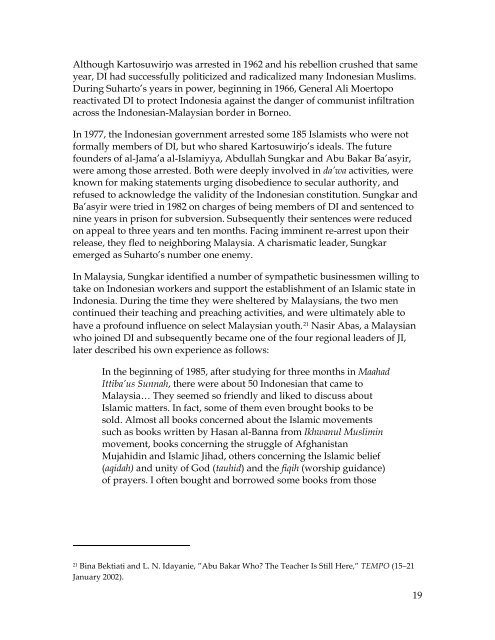Create successful ePaper yourself
Turn your PDF publications into a flip-book with our unique Google optimized e-Paper software.
Although Kartosuwirjo was arrested in 1962 and his rebellion crushed that same<br />
year, DI had successfully politicized and radicalized many Indonesian Muslims.<br />
During Suharto’s years in power, beginning in 1966, General Ali Moertopo<br />
reactivated DI to protect Indonesia against the danger of communist infiltration<br />
across the Indonesian-Malaysian border in Borneo.<br />
In 1977, the Indonesian government arrested some 185 Islamists who were not<br />
formally members of DI, but who shared Kartosuwirjo’s ideals. The future<br />
founders of al-Jama’a al-Islamiyya, Abdullah Sungkar and Abu Bakar Ba’asyir,<br />
were among those arrested. Both were deeply involved in da’wa activities, were<br />
known for making statements urging disobedience to secular authority, and<br />
refused to acknowledge the validity of the Indonesian constitution. Sungkar and<br />
Ba’asyir were tried in 1982 on charges of being members of DI and sentenced to<br />
nine years in prison for subversion. Subsequently their sentences were reduced<br />
on appeal to three years and ten months. Facing imminent re-arrest upon their<br />
release, they fled to neighboring Malaysia. A charismatic leader, Sungkar<br />
emerged as Suharto’s number one enemy.<br />
In Malaysia, Sungkar identified a number of sympathetic businessmen willing to<br />
take on Indonesian workers and support the establishment of an Islamic state in<br />
Indonesia. During the time they were sheltered by Malaysians, the two men<br />
continued their teaching and preaching activities, and were ultimately able to<br />
have a profound influence on select Malaysian youth. 21 Nasir Abas, a Malaysian<br />
who joined DI and subsequently became one of the four regional leaders of JI,<br />
later described his own experience as follows:<br />
In the beginning of 1985, after studying for three months in Maahad<br />
Ittiba’us Sunnah, there were about 50 Indonesian that came to<br />
Malaysia… They seemed so friendly and liked to discuss about<br />
Islamic matters. In fact, some of them even brought books to be<br />
sold. Almost all books concerned about the Islamic movements<br />
such as books written by Hasan al-Banna from Ikhwanul Muslimin<br />
movement, books concerning the struggle of Afghanistan<br />
Mujahidin and Islamic Jihad, others concerning the Islamic belief<br />
(aqidah) and unity of God (tauhid) and the fiqih (worship guidance)<br />
of prayers. I often bought and borrowed some books from those<br />
21<br />
Bina Bektiati and L. N. Idayanie, ”Abu Bakar Who? The Teacher Is Still Here,” TEMPO (15–21<br />
January 2002).<br />
19


